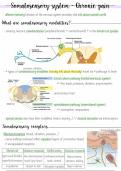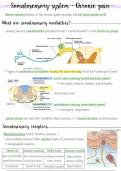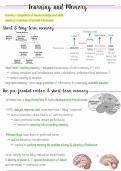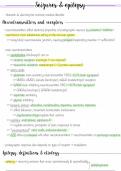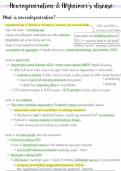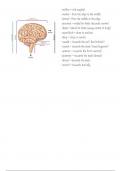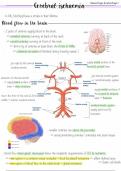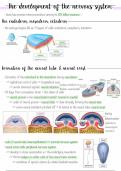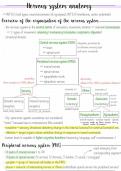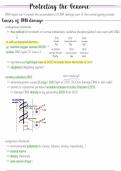Imperial College London (ICL)
Latest uploads at Imperial College London (ICL). Looking for notes at Imperial College London (ICL)? We have lots of notes, study guides and revision notes available for your school.
-
450
-
1
-
29
Courses at Imperial College London (ICL)
Notes available for the following courses at Imperial College London (ICL)
Popular books Imperial College London (ICL)
Latest notes & summaries Imperial College London (ICL)
Lecture notes from Imperial College London, Medical Biosciences BSc, 2nd year, Neuroscience (NEU) module. The afferent (sensory) and efferent (motor) divisions of the nervous system provide vital information about our outside world and allow us to implement an appropriate behaviour. We will look at the sensory system in the first part of this module (a). learning outcomes: LO1: List and define the major somatosensory modalities. LO2: Explain the neurophysiological terms: receptor, st...
Lecture notes from Imperial College London, Medical Biosciences BSc, 2nd year, Neuroscience (NEU) module.
Lecture notes from Imperial College London, Medical Biosciences BSc, 2nd year, Neuroscience (NEU) module. Learning is the acquisition of new knowledge and skills. Memory is the retention of learned information. We learn and remember lots of different things and it is important to appreciate that these various things might not be processed and stored by the same neural hardware. No single brain structure or cellular mechanism accounts for all learning. Moreover, the way in which information of...
Lecture notes from Imperial College London, Medical Biosciences BSc, 2nd year, Neuroscience (NEU) module. Learn what epilepsy is and what steps forward have been made in the management of the condition. Learning outcomes: - Identify the major neurotransmitters in the human nervous system and some of the main receptors. - Describe the etiology and presentation of epilepsy. - Explain the physiological basis of EEG and how it is used to assess seizures. - Analyse the different ty...
Lecture notes from Imperial College London, Medical Biosciences BSc, 2nd year, Neuroscience (NEU) module. One of the great health challenges of our times is to cope with the increasingly prevalent age-related disorders as life expectancy rises globally. Neurodegenerative diseases are among the most devastating of those, leading to relentless impairment of the nervous system’s function, affecting the ability to lead independent lives, and eventually death. Despite large research efforts in t...
Lecture notes from Imperial College London, Medical Biosciences BSc, 2nd year, Neuroscience (NEU) module. Vocabulary neurology + list of classical syndromes and damages.
Lecture notes from Imperial College London, Medical Biosciences BSc, 2nd year, Neuroscience (NEU) module. Cerebral ischaemia: an interruption in the blood supply causing disruption of brain function, usually leading to a permanent sensory, motor or cognitive deficit. It is calculated that in England, one in six people will have a stroke in their lifetime. learning outcomes: LO1: Describe the main features of brain blood circulation. LO2: Distinguish between different types of cerebral ...
Lecture notes from Imperial College London, Medical Biosciences BSc, 2nd year, Neuroscience (NEU) module. Look at the development of the nervous system, with a focus on understanding the structural organisation of the brain and how new neurons and synaptic connections are formed. Learning objectives: LO1: Recognise which embryonic layer gives rise to the nervous system and summarise the formation of the neural tube and neural crest. LO2: Outline how the forebrain, midbrain and hindbra...
Lecture notes from Imperial College London, Medical Biosciences BSc, 2nd year, Neuroscience (NEU) module. learning objectives: LO1: Recall the gross organisation of the human central and peripheral nervous systems LO2: Illustrate the structure and functions of the spinal and cranial nerves LO3: Identify the main CNS structures and summarise their functions: spinal cord, brainstem, diencephalon, basal ganglia, cerebral cortex and cerebellum. LO4: Explain the structure and function of: c...
Lecture notes from Imperial College London, Medical Biosciences BSc, 2nd year, genetics and genomics (GEN) module. Our DNA is under constant threat of being damaged by exogenous and endogenous insults. We have some mechanisms that provide protection from these insults, but there are limits to what they can achieve. In these notes, we consider how DNA damage arises, how it can be avoided, what it actually looks like, and how it is repaired. We also see how mutations in DNA repair genes are ass...


